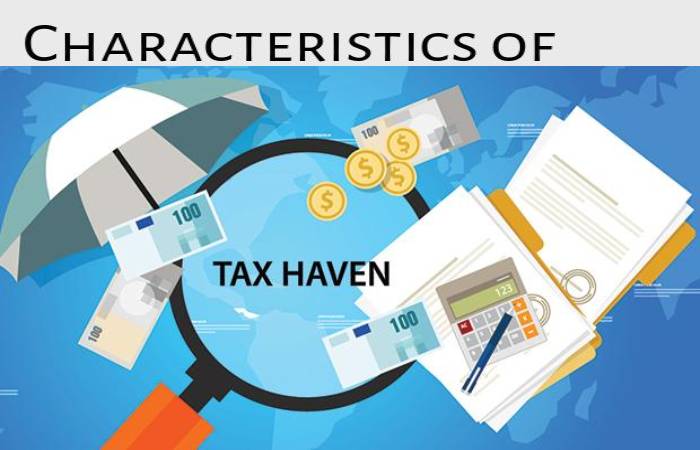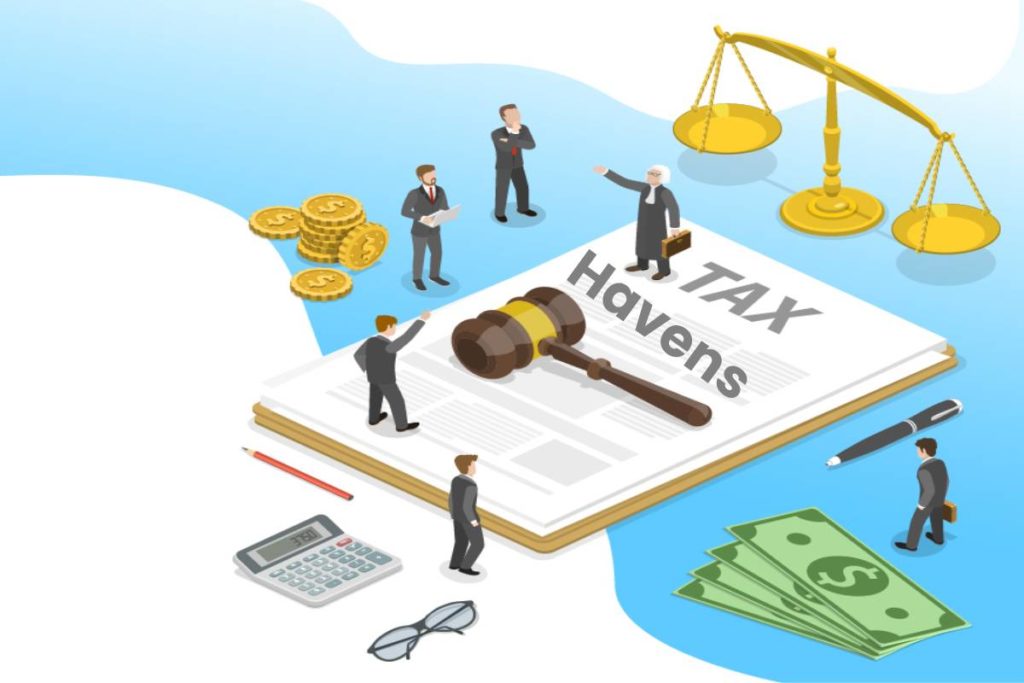Table of Contents
What is a Tax Havens?
A tax havens, also known as a tax shelter due to its not very transparent nature, is nothing more than a territorial political unit with too lax tax regimes.
We can be talking about a whole country like Luxembourg or territory of this, for example, the state of Delaware in the United States.
These are regions where the tax burden is significantly low or nil, in addition to allowing companies to be domiciled legally, even though they do not operate there. For practical purposes, its citizens are supposed to benefit from such low tax burdens, but the truth is more sinister.
It turns out that many companies and corporations, and very wealthy individuals, resort to setting up bank accounts in these places to evade taxes.
What are the Characteristics of a Tax Havens?

Various elements must consider classifying a country as a tax haven. It depends on the government’s legal criteria, entity, or institution that evaluates these territorial spaces. Among the main characteristics of tax shelters we have:
1. No or Very Low Tax Burden
- It is the focal point that attracts thousands of companies and individuals to tax havens.
- Investors or foreign companies should not pay taxes such as income, or companies, among others.
- If they have to make a payment, it is deficient to being entirely nominal.
2. Secrecy and Opacity of Information
- Of course, one of the main magnetism of tax havens is the concealment of information.
- Based on bank confidentiality, it is virtually impossible to access information such as the origin of funds, capital movements, or their owners.
- In many tax havens, the owners of these capitals do not even have an obligation to appear in public records, remaining in the shadows. It uses a facade, and it is common to use figureheads.
3. Fiscal Elasticity
- The legal regulations on tax and divorce competition are incredibly flexible. It allows banks, commercial lawyers, consulting firms, etc. maneuver to get the most out of these niches.
- It also includes the fact that companies can register their domicile in these territories when they do not have any real administrative or operational activity.
4. Duality in Tax Matters
- Citizens of that territory and domestic companies usually bond by a restrictive legal framework very different from international companies.
- It is attractive for these foreign entities as they receive tax benefits that would not be possible in their home countries.
- All this allows so-called offshore companies created to evade taxes, legitimize capital or launder dirty money to abound in tax havens.
Why Tax Havens are a Problem?
A tax haven is a crucial element in the unequal distribution of the world’s wealth. Only 1% of the population has a wealth more significant than that of the remaining 99%.
If you think that tax havens do not affect your day to day and that it only affects the wealthy and large companies, we have bad and bitter news for you: it is not like that.
1. Tax Burden
- The tax burden, which companies avoid in those countries where they carry out their economic activities, implies that the State does not receive that money.
- Therefore, the amount of money available to meet the demands of public spending reductions.
- It is nothing more than the money that governments use to ensure that you, as a citizen, enjoy the benefits of living in that country.
- In short, it means that the rich do not pay what they owe, and the rest of the world must bear these taxes.
2. A Large-Scale Problem
- But this is only the iceberg’s landfill since the impact of this quasi-legal activity generates a series of much more severe and profound consequences for the global community. Let’s look at some other problems that tax havens cause:
- The secrecy of banking information, based on strict confidentiality, allows the saving and later mobilization of capital obtained illegally.
- Thus, the funds stolen by corruption or earned by trafficking in drugs, weapons, or human beings can save.
- In this way, any responsibility with the law at a criminal, fiscal, and civil level can avoid.
- To cover the fiscal gaps caused by this unethical maneuver, the States must increase the tax rates on ordinary citizens.
- The safeguarding of capital of illicit origin is the first of the ways to be able to launder or legitimize those assets.
- Financial instruments generate that capture business capital or large personal fortunes to encourage tax evasion. In this way, the accumulation of wealth in corporative corporations intensifies while the world population is impoverished.
3. Everyone Wants to be Part
- Not only those who profit from using tax havens are companies or people who seek not to pay taxes.
- It is easy to understand why a criminal organization, a terrorist group, or someone who embezzled large sums of money from a State puts that capital in a tax den.
- Also, it is easy to understand how consulting firms and law firms profit from offshore company creation. But there is much more to the world of capital diversion and concealment.
- It turns out that banks are among those that earn the most by joining activities in tax havens, reaching a profit of more than 25% of their income.
- The formula is simple; they obtain a yield of 42% for each operation in tax havens that exceed the average 19% they capture outside of these.
- It is also not just anything, and it explains why we find 20 of the largest banks in Europe doing operations in these territories.
- Although in many cases, they do not have a headquarters directly in their name, they employ other banks as their bank branches. If you want to know what are some of these banks here we put them:
In Spain: Santander Group and BBVA
Germany: Deutshe Bank, Commerzbank, KFW.
From Italy: UniCredit and Intesa San Paolo.
The Netherlands: ING and Rabobank.
From Sweden: Nordea.
From the UK: HBSC, Barclays, RBS, Lloyds Bank, and Standard Chartered.
What are the Main Companies that Use Tax Havens?

- It is common to hear the stories of how many of the largest and most lucrative companies in the world were born from humble substrates, and with effort, work and genius, they triumphed.
- And also, it may be accurate, but what they don’t tell you is how they avoid paying large sums of money to maintain themselves as what they are: corporate giants.
- The United States of North America brings together half a hundred companies that keep their capitals in tax havens.
- Among all of them, we have the chilling number of 151,179.44 billion euros that divert to pay little or almost no taxes in the State where they operate.
- This list head by Apple, Pfizer, Microsoft, General Electric, IBM, Merck, Alphabet (Google), Cisco System, Johnson & Johnson, and Oracle.
- Familiar names such as PepsiCo, Coca-Cola, Intel, JPMorgan Chase, Home Depot, General Motors, Wells Fargo, Walt Disney, AT&T, and Mondelez International also stand out.
- As you can see, one of the ways that these companies became giants was, to no small extent, distributing the tax burden on those who buy or acquire their products and services—the perfect business.
Which are the Agencies that Act against Tax Havens?
- Given the terrible impact that tax havens cause, they have become crucial for major world economies.
- Today, several states have come together to try to minimize the impact of tax havens on the economy.
- An example of this is the creation of the Organization for Economic Cooperation and Development, OECD. The European Union’s intention to apply pressure mechanisms to the States classified as tax havens can help first focus on eliminating confidentiality. The reason is easy to see. Without this resource, you can trace the origin of capital, its movements, and of course, to whom it belongs.
- The OECD pioneered in 1998 in generating a list that included these countries that promote tax evasion.
- It had to wait seven years, thanks to the delays applied by Luxembourg, Switzerland, Austria, and Belgium, before finally, in 2005, a law on interest taxes establish in Europe.
- But the success until then was partial because the information did not include the origin of the capital.
- The year 2014 marked a breakthrough in terms of “zero” tax evasion when 51 countries joined an international agreement to suppress bank secrecy.
- It also achieves thanks to the pressures in the world system where states were in dire need of resources after the financial collapse of 2008.
List of Tax Havens
As expected, the list of countries and territories considered tax havens is, unfortunately, pervasive.
The OECD, the European Union, the International Monetary Fund, and each country has its list of countries considered tax-havens. This variation is the elements that each entity considers to justify a State’s inclusion in that classification.
1. OECD Black List
According to the OECD, the only tax haven in the world is Trinidad and Tobago. The following are countries that have relaxed their banking secrecy to a greater or lesser extent for fear of sanctions. And also, the latter are:
- Andorra
- Eel
- Old and bearded
- Aruba
- Bahamas
- Bahrain
- Bermuda
- Belize
- Cyprus
- Curacao
- Dominica
- Gibraltar
- Pomegranate
- Guernsey
- Cook islands
- Isles of Man
- And also, Cayman Islands
- Marshall Islands
- The British Virgin Islands
- Turks and Caicos Islands
- US Virgin Islands
- Seychelles island
- Liberia
- Liechtenstein
- Maldives
- malt
- Mauricio
- Monaco
- Monserrat
- Nauru
- Niue
- Samoa
- Saint Kitts and Nevis
- St. Vincent and the Grenadines
- San Marino
- St. Lucia
- Trinidad and Tobago
- And also, Vanuatu
2. International Monetary Fund
For its part, the International Monetary Fund, taking into account various sources, such as the NGO above Oxfam, include:
- Hong Kong
- Singapore
- Luxembourg
- Arab Emirates
- Netherlands
- Switzerland
- Taiwan
- Panama
- Ireland
- Serbia
- Oman
- Palau
- Guam
- United States of America
- And also, Germany
- Guernsey
- Lebanon
- Japan
- Thailand
- Canada
- Malaysia
- Barbados
- Ghana
- Montenegro
- Macedonia
- Botswana
- Taste
- Bosnia and Herzegovina
- Sri Lanka
- Yemen
- Tunisia
- Syria
- Pakistan
- Iran
- Ethiopia
- North Korea
- Fiji
- Greenland
- Albania
- Faroe Islands
- Cambodia
- And also, American Samoa
3. The European Union
Like other European countries, its criteria to designate a territory within its blacklist of tax havens.
In concrete terms, if a country signs and implements an exchange of information on tax matters, it is a condition to remove it from said list. And also, but it has also created a set of tax control mechanisms. Some of these requirements are:
The International Fiscal Transparency Regime
This instrument seeks that those who reside in the territory must contribute to the treasury the income tax of physical persons. It also aims to avoid that these people who placed their capital in companies in environments with low tax rates stop paying what they owe.
The Model 720
This informative declaration requires the taxpayer to declare their properties, assets, and rights in a foreign territory.
Model 232
This return must be submitted by those consider within the taxpayer category of corporation tax and non-resident income tax. And also, these focus on related-party transactions in some commercial or family-type transactions to avoid tax fraud. Additionally, for businesses navigating the realm of corporation tax and non-resident income tax, it’s imperative to stay abreast of regulatory changes, such as the transition to Making Tax Digital for Corporation Tax. This initiative aims to enhance the accuracy and transparency of tax reporting, emphasizing the importance of meticulous record-keeping, especially in transactions involving related parties to prevent tax fraud.

